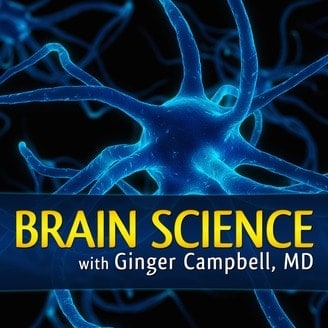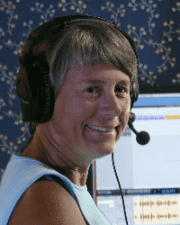Brain Science Podcast: From Consciousness to Cognition

Last updated on January 29th, 2020
A guide to how our brain works
Consider this: It’s June 2005 and Apple had just added podcasting to its iTunes 4.9 music software and is building a directory of podcasts at its iTunes Music Store. Back then, you needed an mp3 player to listen to podcasts and podcasting was truly in its infancy. In fact, less than one percent of the podcasts listed in the 2005 directory are still around in 2020.
In that wide-open podcast frontier land, an unlikely early adopter was a Dr. Virginia “Ginger” Campbell – an Alabama-based, experienced Emergency and Palliative Medicine physician.
Soon thereafter, she began the Brain Science podcast in 2006. Why pick neuroscience as a topic?
“I’ve always been fascinated by the brain and neuroscience,” Dr. Campbell begins, “and back then it wasn’t in vogue and so it wasn’t covered extensively in any media form, especially podcasting.”

Brain Browsing
In the beginning, Dr. Campbell was reading books about neuroscience and then summarizing the books on the podcast. She used to browse bookstores in the science section for podcast episode ideas. And throughout the podcast, she has been sustained by listener feedback and ideas.
However, she quickly began to invite the authors of neuroscience books on her podcast and over 14 years has been able to attract the pre-eminent names in the field of neuroscience.
For example, in the September 2019 episode, Dr. Campbell scored an interview with respected neuroscientist Joseph Ledoux, whose new book The Deep History of Ourselves: The Four-Billion-Year Story of How We Got Conscious Brains reaches two controversial conclusions. Ledoux contends that emotion evolved after consciousness and that emotions are not the product of natural selection.
Today, with the podcast attracting a growing audience, Dr. Campbell now receives neuroscience books from publishers in the hope that she will read the book and invite the author on her show. A move that is bound to increase the author’s and publisher’s book sales.

On thousands of podcasts, authors are interviewed and due to either time constraints or other obstacles, the podcasts’ hosts don’t read the book. For Dr. Campbell, that is absolutely forbidden. When a scientist has written a neuroscience book and is scheduled to be interviewed on the podcast, Dr. Campbell reads the book – twice.
“I read once for pleasure and comprehension,” she explains. “Then the second time I take a lot of notes and form my questions for the podcast.
As early as 2007, Dr. Campbell indulged her fascination for understanding the nature of our consciousness and that curiosity has led to some of her best episodes. For instance, in October 2007, she interviewed Dr. Christof Koch of Cal Tech, one of the pioneers in the neurobiological study of consciousness. About two decades ago, when Koch and Francis Crick began looking for what they called the neural correlates of consciousness (NCC), such a quest was considered controversial; but now the field is increasing in popularity. In her interview, they discussed Koch’s book The Quest for Consciousness, as well as his on-going research and his thoughts about what the future might bring.
In late 2019, Brain Science unveiled an ambitious four-part series on the nature of consciousness culminating with another interview with Dr. Koch about consciousness and its relationship to computing.
Download Details
Since its inception, Brain Science has been downloaded more than 10 million times and has been nominated as the Best Science Podcast twice and is regularly one of the top science podcasts in terms of listeners.
Campbell calls Brain Science “the show for everyone who has a brain, because it appeals to diverse listeners ranging from those with no science background to professionals in the neuroscience field.”
Since its inception, Brain Science has been a monthly podcast, but in 2020 Dr. Campbell has decided to record two episodes a month. That goal is especially noteworthy considering that Dr. Campbell is still a practicing physician.
Her first episode in 2020 was Neuroscience and Magic (episode 165) – an interview with neuroscientists Stephen L. Macknik and Susana Martinez-Conde. During the episode, Dr. Campbell discussed their international bestseller “Sleights of Mind: What the Neuroscience of Magic Reveals about Our Everyday Deceptions.”
Sleights of Mind explains magic tricks by revealing the shortcuts, limits and programming of the brain (and attendant sensory systems) that facilitate such tricks. The authors first review visual illusions and point out the many limitations and gaps in our visual processing system. As the authors state, “the spooky truth is that your brain constructs reality, visual and otherwise.”
Later in the interview, the authors deal with cognitive illusions. Just like our visual system, our conscious minds save energy by engaging in shortcuts that disguise the mind’s limits while offering the possibility of manipulation. The brain also works hard to reconcile what appears to be inconsistencies, and often this reconciliation leads us astray and misdirection by the illusionist is successful.
When one podcast isn’t enough
Dr. Campbell, a voracious reader with a peripatetic mind, found that her interests expanded beyond neuroscience so she began a second podcast called Books And Ideas. On Books and Ideas Dr. Campbell explores a wide range of topics ranging from science fiction to the philosophy of science.
For example, recent episodes include Adele Brand, author of the new book The Hidden World of the Fox and discusses how foxes are surprisingly widespread even in urban areas. Earlier in 2019, Dr. Campbell interviewed Ryder Carroll, author of The Bullet Journal Method: Track the Past, Order the Present, Design the Future. In the episode, he describes how he developed a popular organizational method that combines to-do lists and journaling.
“Books and Ideas indulges my innate scientific curiosity about the world around us,” Dr. Campbell notes. “I cast a wide net on this podcast. In one episode I spoke with psychologist Dr Pete Etchells about his book Lost in a Good Game: Why we play video games and what they can do for us and we explored both the myths and the science behind video games and consider why the effects of video games are actually quite difficult to study. Then in the next episode I interviewed LGBTQ historian Lillian Faderman and her book Harvey Milk: His Lives and Death. Milk was the first openly gay man elected to public office, who was assassinated in 1978 after less than a year in office.”
A podcasting pioneer
If you check out the life cycle of the average podcast, the typical show lasts about the life span of a hamster. Especially in those trail-blazing early days before smartphones as listening devices, podcasts were novel media experiments from people with a microphone and a dream.
And a shining star of resilience, listener-based content, intellectual curiosity and relevance is the Brain Science podcast hosted by Dr. Virginia “Ginger” Campbell. In the last 14 years, she’s built the podcast into a platform for scholarly “yet applicable for the layperson” discussions on how our brain works, how it’s built, and how it can shape our reality.
American physicist Michio Kaku once said, “the human brain has 100 billion neurons, each neuron connected to 10 thousand other neurons. Sitting on your shoulders is the most complicated object in the known universe.”
The Brain Science podcast is able to distill that complexity into easy-to-understand concepts for its listeners.













Comments
Comments are closed.